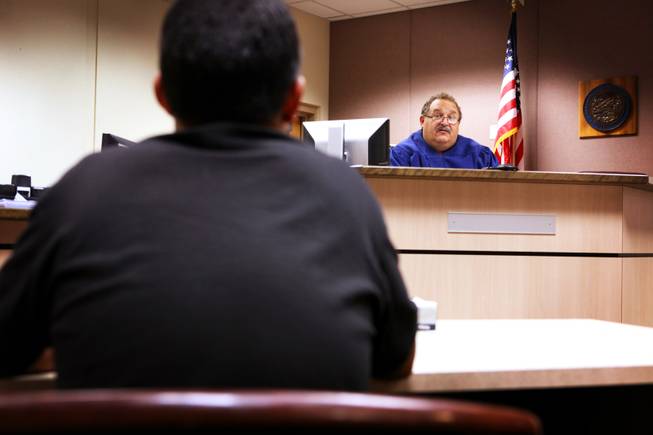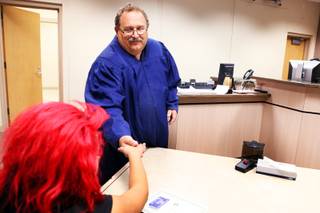
Andrew, 16, appears before Judge Stephen Compan during the diversion court program held at Clark County Family Courts in Las Vegas on Wednesday, October 3, 2012.
Wednesday, Oct. 10, 2012 | 2 a.m.
It’s shortly after 3 p.m. on a Wednesday in Courtroom 15 at Clark County Family Court.
The public seating fills up as Judge Stephen Compan, wearing a blue robe, enters. He welcomes those seated and issues one request:
Please talk nicely to the kids.
It’s a statement not uttered often in a courtroom setting, but this room is different. Despite its name — diversion court — this year-old program is not really a true courtroom, aside from its location. It’s an environment where community agencies, treatment providers and mentors come together to support at-risk teens, particularly minorities who enter the justice system in disproportionate numbers.
“This is a global-village type of thing,” Compan tells the community partners assembled. “I’m glad you’re here, and I look forward to working with you.”
The teenagers about to enter do so voluntarily, or at least at the direction of their parents who accompany them. The teens aren't hardened criminals, but that’s why they're here: They’ve received a few citations — maybe for alcohol or drugs, petty larceny or a curfew violation — enough to spark concern.
If the pattern continues, there’s a good chance an arrest will follow and, with it, a formal charge from the Clark County District Attorney’s Office, said Family Court Judge William Voy.
When that happens, officials know there’s a greater likelihood it will be a minority entering the juvenile detention center.
•••
Sun archives
Juvenile offenders work off their sentences with a variety of community services (Aug. 02, 2011)
Juvenile offenders helping clean up homes in foreclosure (July 30, 2011)
Last year, about 41 percent of juveniles arrested in Clark County were Hispanic and 26 percent were black, according to data provided by Juvenile Justice Services. Compare that with the demographics of the school system: Only 12 percent of the student population is black, while 43 percent is Hispanic.
“They’re coming to us in disproportionate numbers,” Voy said. “We’re in the hole to begin with.”
White students make up about 30 percent of the school population, but they represent only 26 percent of juveniles arrested in Clark County, according to the data.
It’s not a new trend, nor is it isolated to the Las Vegas Valley. Black youths ages 10 through 17 are four times more likely to be incarcerated than white youths, according to a 2011 report by the National Conference of State Legislators.
Voy and others believe part of the solution lies in early intervention, the genesis behind the diversion court program, which debuted in October 2011.
Diversion court is voluntary, offered to children and teens cited or, in some cases arrested, who officials believe might commit another offense based on their history and life circumstances, Voy said.
The program pairs them with appropriate community resources, such as substance-abuse centers, nonprofit organizations and mentors. If the teens complete the recommended steps, which often include community service, the citations will be dismissed.
The program emphasizes an honest, open environment, where the teens can share their difficulties and Compan and mentors can offer guidance.
“It’s kind of a soft, cuddly approach in there, but it’s really working,” said Compan, who runs diversion court.
Officials say a positive connection with an adult mentor can make a world of difference for some at-risk teens, many of whom come from unstable living situations.
“Most of these kids really want help, and they recognize there’s a problem going on with their family,” Compan said. “It’s amazing what they’ll tell that’s going on in their lives.”
Diversion court, which isn’t limited to minorities, is offered at no cost to the teens and their families, Voy said. Community partners volunteer their time, often tailoring their services to fit the teens’ needs.
Brandon Dover, a volunteer from Addicted to Hope, is one of those mentors. A former drug user who served prison time, Dover delivers the blunt truth to the teens, hoping his testimony can affect them.
“I like the whole concept of addressing the kids before they get to prison,” he said. “Just to see it develop and succeed has been an awesome experience.”
•••
Sun archives
High-tech ball and chain means more freedom for youth offenders (July 12, 2011)
In crime, teens see a dead end at coroner’s office (Oct. 5, 2010)
The buy-in isn’t always easy, though.
An hour into diversion court Wednesday, 14-year-old Brad slouches in a chair next to his weeping mother. Brad says he doesn’t think marijuana use is a big deal. He calls his series of citations — drug use, fights, curfew violations — the results of “bad mistakes, bad choices.”
Even so, Brad claims he wants a chance in the program. Compan gives him one, but only after he makes the teen look into his mother’s eyes for 25 seconds.
Compan orders him to complete drug treatment, perform community service, participate in an anti-gang program and meet with a mentor.
“They’re going to be on you like glue,” Compan says, referring to the community partners. “They don’t want you to screw up.”
If all goes well, Brad will appear again before Compan in a few months, ready to graduate — just like 15-year-old Diana.
Diana, sporting a patch of neon pink hair, entered diversion court after citations for petty larceny and obstructing an officer. This time, though, she arrives ready to graduate upon completing her own series of requirements.
“We’ll graduate you today,” Compan tells her, “but you know that mentor relationship continues.”
Compan hands Diana a certification of completion and movie tickets.
“This you’ve earned for the changes in your life.”


Join the Discussion:
Check this out for a full explanation of our conversion to the LiveFyre commenting system and instructions on how to sign up for an account.
Full comments policy